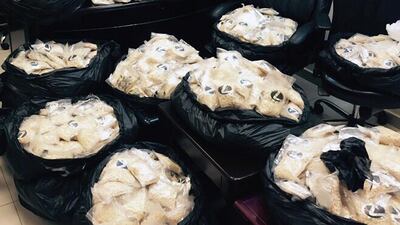As Arab nations lead the fight against ISIL and other extremist groups, a silent war is being waged closer to home.
The enemy goes by many names: Captagon, hashish, heroin, Spice, Joker.
Illegal drugs are spreading through the conflicts that plague the Arab world, produced in war zones such as Syria and smuggled into Jordan, Egypt and the Gulf.
The United Nations Office on Drugs and Crime has warned of an increasing drug-violence nexus in Syria. A similar relationship between drugs and armed conflict is reportedly emerging in Yemen.
Armed groups take advantage of chaos to trade and sell drugs, and in turn drug money is helping militias arm themselves, prolonging the conflict.
Moderate and mainstream Syrian rebel commanders associated with the Free Syrian Army admit that certain militias and commanders turn a blind eye to the smuggling of amphetamines over the border with Jordan, where they can reach the lucrative Gulf market.
Even Islamist and Salafist militias, including Al Qaeda’s Jabhat Al Nusra, have been implicated in profiting from drugs passing through their territory in Syria.
Chief among the drugs smuggled through Syria are amphetamines. Using little more than a pill press, chalk, amphetamines or caffeine – all easily found in Syria, a former pharmaceutical exporter – armed groups and criminal gangs can produce amphetamine tablets for pennies and sell them for as much as $100 a capsule on the Gulf market.
Because the rule of law is absent, it is difficult to obtain data on drug production and trade through Syria. But the proof of the rising drug trade can be found in Syria’s neighbours, where the amount of illegal drugs seized on the borders is growing year after year.
Before the Syrian conflict, Jordan anti-narcotics and customs officials seized close to one million Captagon pills a year. In 2015, Jordanian officials seized 50 million capsules, and more than 70 million in 2016 – nearly all coming from Syria and destined for the Jordanian and Gulf markets.
Saudi Arabia, an end destination, has seized 100 million tablets annually for the past two years.
But the threat is not coming from Syria alone.
Synthetic marijuana, laced with highly addictive chemicals and cut with household items ranging from detergent to rat poison, is making its way from China to the streets of Arab capitals.
Sold in slick, attractive packets featuring cartoon animals and exaggerated fonts, synthetic marijuana is being sold for as little as $5 per pack in countries including Jordan, Lebanon and Egypt. Known by names such as Spice, Joker and Strawberry, the drug is being used recreationally in Jordan by children as young as 12.
Due to the lack of a central state and conflict in Yemen, the illicit trade of more traditional drugs such as hashish is reportedly on the rise, with several large-scale attempts to smuggle dozens of kilograms of hashish over its borders with Saudi Arabia.
In Arab countries there has also been an increase in the smuggling of hard drugs, much of it through Syria. Saudi Arabia reported a spike in seizures of cocaine from 4.6 kilograms in 2013 to over 535kg in 2014 and 400kg in a four-month period of 2015.
Many Arab states face a war against drugs on two fronts: at their borders and among drugs rings at home.
The impact on society is far-reaching. Rehabilitation centres in Jordan are at capacity, and there is great pressure on drug-treatment centres in Saudi Arabia. Families are being torn apart as young men and women – many under pressure at school or university – turn to tablets to improve their performance.
Unemployment in places such as Jordan and Egypt is leading many young people to discover drugs when they are more readily available than at any other time in the region’s history.
Tough laws criminalising the sale, use and possession of drugs are not enough. Borders can only become so tight; security forces so alert.
The true answer to curbing the illicit drug trade in the Arab world is in finding peaceful and sustainable solutions to the region’s conflicts.
Only with strong governments and the rule of law can the Arab world take away the conditions that have allowed drug producers, smugglers and dealers to thrive.
Only by stopping the vicious cycle of conflict and drug money can the Arab world and the broader international community stop the scourge of drugs at its source.
While the international community is rightly focused on extremism, it should also aid the Arab world in the battle against conflict’s deadly spawn – drugs.
Just as in the fight against violent extremism, future generations are at stake.
Taylor Luck is a political analyst and journalist in Amman
